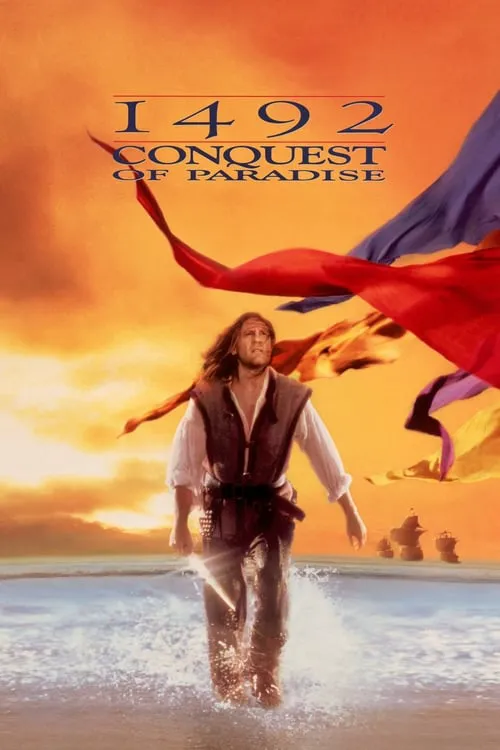1492: Conquest of Paradise

Plot
Christopher Columbus, a skilled sailor and an Italian navigator, had spent many years studying the works of the ancient Greek, Pythagoras, and other notable philosophers and thinkers. Intrigued by the concept of a round Earth, Columbus became obsessed with the idea that there existed a sea route to Asia. This notion had been dismissed as a myth by the general population for centuries, but Columbus remained resolute in his pursuit of truth. In 1485, Columbus arrived at the court of King John II of Portugal to discuss his plans for a westward voyage across the Atlantic Ocean. However, upon realizing the King's skepticism, Columbus shifted his focus towards Spain. He arrived in the city of Córdoba and successfully secured an appointment with King Ferdinand and Queen Isabella of Spain. Columbus was a charismatic individual with a persuasive manner, which proved crucial in garnering support for his ambitious plan. He impressed the monarchs with a passionate plea for funding, explaining how a westward voyage could potentially unlock a new trade route to Asia, thus establishing Spain as a dominant maritime nation. The King and Queen were initially hesitant but eventually agreed to Columbus' demands, providing him with the necessary funding and a royal decree giving him three years to find a new route to Asia. Upon departure, Columbus encountered numerous challenges, including the skepticism of his crew and the treacherous waters of the Atlantic Ocean. To alleviate the situation, he implemented various strategies, including the use of an astrolabe for navigation and introducing a system of rewards for the crew to boost morale. On August 3, 1492, three ships, the Santa Maria, the Pinta, and the Niña, set off from the port of Palos in southern Spain. The crew comprised seasoned sailors and noblemen, including Martín Alonso Pinzón, who would later play a pivotal role in Columbus' voyage. As the trio entered the Atlantic, the tension among the crew members began to rise, particularly when some crew members expressed their discontent with Columbus' leadership. The first several weeks of the voyage proved to be a struggle for the crew, with Columbus facing criticism from the crew members. However, Columbus remained steadfast in his resolve to reach the East Indies. It wasn't until the autumn equinox that the crew began to notice a change in the ocean's temperature and the increasing number of sea life, hinting at their proximity to land. On October 12, 1492, Columbus spotted the first signs of land, later identified as Guanahani Island in the Bahamas. This marked a pivotal moment in history as it marked the arrival of the first Europeans to the Americas. The initial encounter with the indigenous Taino people, led by the enigmatic Calochó, was marked by curiosity and cautiousness. However, as Columbus and his crew spent more time on the island, the relationship began to deteriorate. The Taino people, who were skilled farmers and fishermen, demonstrated a deep understanding and respect for the natural world. Conversely, Columbus' crew was more interested in extracting resources, including gold, and taking control of the island. Upon Columbus' return to Spain, he was greeted with enthusiasm and accolades by the monarchs and the Spanish people. However, as news of his exploits began to spread, concerns about the impact of his actions began to emerge. Many people questioned the ethics of Columbus' treatment of the Taino people, who had been subjected to violence, enslavement, and forced labor. The voyage's consequences went beyond the immediate impact on the Taino people. It marked the beginning of colonization, which would eventually result in the displacement and exploitation of indigenous populations throughout the Americas. Additionally, Columbus' discovery opened up new trade routes, leading to a period of European growth and expansion. As Columbus' influence grew, he found himself at the center of a struggle for power and control. Fearing that he would be replaced or discredited, Columbus faced opposition from those who sought to take advantage of his position. He eventually convinced King Ferdinand and Queen Isabella to crown him Admiral of the Ocean Sea, a title that solidified his power and influence. As the years went by, Columbus continued to advocate for his vision of a New World, while grappling with the consequences of his actions. His story, which began with unwavering optimism and determination, ultimately became entangled with the dark threads of colonialism and exploitation. The complexities of Columbus' legacy continue to shape the way we understand the history of the Americas, and the intricate narrative of his voyage serves as a poignant reminder of the consequences of human ambition and the importance of empathy towards others.
Reviews
Recommendations




